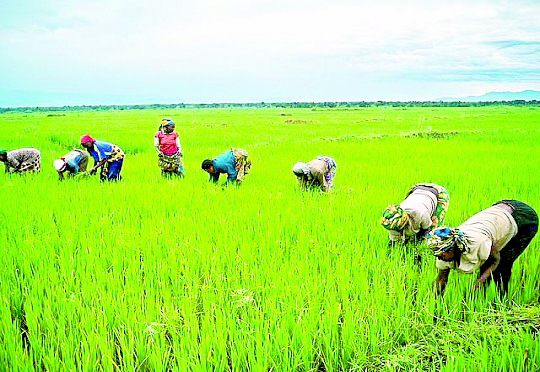Nyando farmers bet on new rice variety to boost income
By Viola Kosome, December 9, 2022Since 1970 Mathews Mbeka has always relied on traditional rice breeds to plant in his farm at the vast Ahero Irrigation Scheme. As one of the oldest farmers at the scheme who has seen it all and survived the changes, he knows how the trends in output has changed over the years.
After more than five decades of rice farming things appear not to be rosy anymore, with fortunes dwindling and the number of bags harvested on a steady decline. “In the past, I would get up to 30 bags from an acre but the output has drastically reduced to less than 20 bags while the cost of production has also shot up,” he explains.
Mbeka has, however, changed tack and shifted to hybrid rice seeds to reverse the alarming trends witnessed with the traditional rice breeds. He is among several farmers at the scheme who have now adopted new rice breeds as they eye boosting their produce and increasing the number of bags they harvest each season.
A spot check by Business Hub at the scheme and interviews with several farmers established that they have now shifted their attention to hybrid rice varieties.
A number of farmers were busy attending to their rice crop in their plots. While some were busy inspecting their farms and removing weeds, others were replanting.
Matures faster
They say the new varieties are more resilient to diseases and matures faster while also reducing the cost of production.
“Agriculture is part and parcel of life and thanks to hybrid rice, I have been able to get more than double of what I used to get before, “said Mbeka. He has planted the hybrid rice since last year. In his first attempt, he managed to get 48 bags of rice from a parcel of land where he would hitherto got less than 20 bags from the traditional variety.
“Two years ago, I only managed to get 18 bags of rice with the traditional variety,” he says. At the scheme, he is among the farmers leading the push for more of them to abandon the traditional variety in favour of hybrid varieties.
Another farmer told Business Hub that the hybrid variety is not affected by birds the same way traditional varieties which attract large flock of birds which end up destroying them.
According to Kennedy Ouma, National Irrigation Authority (NIA) Manager in charge of Western Kenya says the introduction of new seeds is vital in helping improve production.
To increase production, he adds, the first thing farmers need to do is to ensure that they have better seeds, arguing that if they have good seeds and increased production, they will be able to compete in the market. The good seeds he says will have higher production and the produce they make will be easily accepted in the market.
With the introduction of hybrid rice in the area, Ouma states, farmers are now recording high yields.
“I am happy that as the National Irrigation Authority, we have partnered with other stakeholders to be able to address some of the challenges that the farmers have to ensure that farmers record increased production,” he says.
One of the organisations that have introduced hybrid seeds to farmers at the scheme is Alliance for Hybrid in Africa which has collaborated with National Irrigation Authority to improve production.
According to Kayode Sanni, Rice Project Manager at the African Agricultural Technology Foundation (AATF), they have developed hybrid rice that are high yielding.
In Ahero, he said, they used AH18007, AH18004,AH18003,PWAN GOLD PLUS and ARIZE GOLD 6444.
He added that they have succeeded in developing hybrid rice technology through the partnership between African Agricultural Technology Foundation and Hybrid East Africa Ltd where they have developed hybrids which are allocated to different seed companies.
According to him, the hybrids have the potential of yielding up to 10 tonnes per hectare. The trials Sanni said have been done in Mwea Irrigation Scheme where they have received three tonnes higher than the traditional breeds.
Increase income
He urged farmers to resort to the hybrid rice, saying they will get 10 to 30 extra bags per hectares. In Ahero, they showcased four different hybrid rice to farmers where most of the farmers resorted to hybrid.
“We are trying to help the farmers attend to their needs by introducing the hybrid rice that will increase their income,” said Sanni. He says that the variety they have developed is in line with what is being imported from Pakistan.
He also revealed that close to 90 per cent of rice that is sold in Kenya is imported, adding; ““What we have been producing is just about 10-15 per cent yet the hybrids we have here have all qualities and reassemble what we import, “he said.
In Mwea, he said thousands of farmers have been embracing the hybrid rice and have been getting more bags too.
